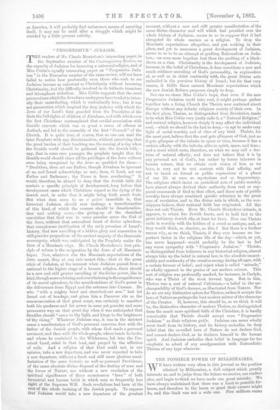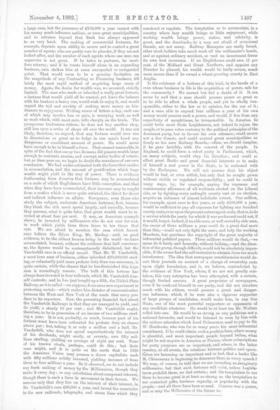THE POSSIBLE POWER OF MILLIONAIRES.
WE have written very often in this journal on the position attained by Millionaires, a dull subject which greatly interests us, and to judge from the letters we receive, our readers also, and begin to think we have made one great mistake. We have always maintained that there was a limit to possible for- tunes, and therefore to the harm or good their owners might do, and this limit was not a wide one. Five millions seems a large sum, but the possessor of £150,000 a year cannot with his money much influence nations, or even great municipalities, and to advance beyond that limit has always appeared to us very hard. The making of commercial fortunes, for example, depends upon ability to secure and to control a great number of agents, who are pretty sure to plunder, if they are not looked after, and the number of such agents whom one man can supervise is not great. If he takes in partners, he sacri- fices returns ; and if he trusts himself alone in an expanding business, ruin strikes him at some unexpected or unregarded point. That would seem to be a genuine limitation on the magnitude of any Contracting or Financing business, till lately the most rapid method of acquiring large sums of money. Again, the desire for wealth was, we assumed, strictly limited. The man who made or inherited a really great fortune, a fortune that would yield all he wanted, yet leave the balance with his bankers a heavy one, would wish to enjoy it, and would regard the toil and anxiety of making more money as hin- drances to enjoyment. Writing scores of letters a day, each one of which may involve loss or gain, is wearying work, as well as work which, with most men, tells sharply on the brain. The prosperous tradesman retires ; he does not buy another shop, still less open a series of shops all over the world. It was not likely, therefore, we argued, that any fortune would ever rise to dimensions so great as to lodge in one man's hand any dangerous or exorbitant amount of power. He would never have enough to be in himself a force. That seemed reasonable, in spite of the fact that one qr two Romans did possess wealth large enough to maintain armies, and corrupt entire bodies of voters ; but as time goes on, we begin to doubt the soundness of our own conclusion. We had under-estimated both the force that resides in accumulation, and the amount of gratification which huge wealth might yield in the way of power. There is evidence forthcoming from America that fortunes may be accumulated on a scale of which Englishmen have little conception, and that when they have been accumulated, their increase may be sought from a motive which is never quite satiated, the thirst for direct and indirect influence on affairs. Europeans, even those who study the subject, underrate American fortunes, first, because they think the rich must spend largely, and secondly, because they assume, what is quite false, that great wealth must be in- vested at about four per cent. It may, as American example shows, be invested by millionaires who do not care for rest, in work which yields from three times to ten times that rate. We are afraid to mention the sum which Ameri- cans believe the Silver King, Mr. Mackay—said, on good evidence, to be the richest human being in the world—to have accumulated, because, without the evidence that half convinces us, the figures would be contemptuously disbelieved, but the Vanderbilt case is on official record. That Mr. W. Vanderbilt, a most keen man of business, either inherited 220,000,000 sterl- ing, or voluntarily paid more probate duty than was necessary, is quite certain, while the chance that he has diminished this huge sum is exceedingly remote. The bulk of this fortune has always been invested in four railroads, which Mr. Vanderbilt him- self controls; and he has just bought up a fifth, the Nickel-Plato Railway, as it is called—we sappose, from some new experiment in protecting metals—which makes him dictator of communication between the West and New York of the roads that carry pro- duce to its exporters. Now, the governing financial fact about the Vanderbilt Railways is that they are managed to yield, and do yield, a steady 10 per cent. ; and Mr. Vanderbilt ought, therefore, to be in possession of an income of two millions sterl- ing a year. It is not, probably, so much, because part of his fortune must have been estimated fon probate duty on shares above par ; but, taking it at only a million and a half, Mr. Vanderbilt, who does not spend unproductively the interest of his dividends, might easily, at seventy, own fifty mil- lions .sterling, yielding an average of eight per cent. None of his known rivals, perhaps, could do this ; but their sons might, and it is (pita on. the cards that in 1920 the American Union may possess a dozen capitalists each with fifty millions solidly invested, yielding incomes of from three to four millions a year. Be it observed, we do not include any fresh making of money by the Millionaires, though they make it every day; or any calculation about compound interest, though there is such a force in movement in their favour. We assume only that they live on the interest of their interest, in Mr. Vauderbilt's case 260,000 a year, and invest the remainder in the new railroads, telegraphs, and steam lines which they
construct or regulate. The temptation so to accumulate, in a country where lazy wealth brings so little enjoyment, while working wealth brings power, status, and celebrity, is great, and the drawbacks, to a man not afraid of occasional threats, are not many. Railway Managers are easily found, other stock-holders take much work off the millionaire's hands, and as against ordinary accident, so vast an investment forms its own best insurance. If an Englishman could own 51 per cent. of the Midland and Great Northern, and appoint any Director he pleased, his wealth would be fairly secure, much more secure than if he owned a wheat-growing county in East
Anglia. -
Is the existence of a fortune of this kind, in the hands of a man whose business in life is the acquisition of power, safe for the community We cannot but feel a doubt of it. It can never be well that a man should possess power so great as to be able to affect a whole people, and yet be wholly irre- sponsible, either to the law or to opinion, for the use of it; and a man able to expend four millions a year of his own money would possess such a power, and would, if free from any superfluity of naughtiness, be irresponsible. In America, he could bribe most State Legislatures, not indeed to injure the people, or to pass votes contrary to the political principles of the dominant party, but to favour his own schemes ; could secure not a few Courts, and could control great municipalities as firmly as his own Railway Boards,—often, we should imagine, if he gave lavishly, with the consent of the people. In England, he could form a select party in Parliament, which, on many subjects, would obey his direction ; and could so affect greet Banks and great financial interests as to make of himself a real power in the State, to be reckoned with by the Exchequer. We will not assume that his object would be bad, or even selfish, but only that he sought power without visible or regulated responsibility ; and he could in many ways, by, for example, paying the expenses and maintenance allowance of all workmen elected on the Liberal side, or by fighting every unfought comity seat at an election, acquire an influence of almost indefinite extent. One million, for example, spent once in five years, or only 2200,000 a year, would be sufficient to pay all expenses for fighting one hundred county seats, even upon the present extravagant scale, that is, to do a service which the party for which it was performed could not, if it would, forget. Indeed, if an able man, or well servedby able men, the owner of three millions a year could do a great deal more than this,—could not only fight the seats, and help the working Members, but purchase the copyright of the great majority of influential political papers. Three millions would do that,—we mean do it fairly and honestly, without bribing,—and the direc- tion of the group, though difficult, would not be absolutely impos- sible, if the owner had the self-restraint to abstain from too much interference. The idea that newspaper constituencies would de- sert their journals on account of a change of ownership rests upon slight foundation, and is, we believe, contradicted by the evidence of New York, where, if we are not greatly mis- taken, this very enterprise has been attempted, with a certain, though limited success. A great proprietor of newspapers, even if he confined himself to one party, and did not interfere much with his editors, would possess a great and danger- ous influence, which, if he were also a vigorous supporter of large groups of candidates, would make him, in any free State, one of the most powerful supporters or opponents of any candidate whatever. He would be at least ten Mr. Walters rolled into one. He would be as strong as any politician not a national favourite, and would be listened to even by him with the serious attention which Lord Palmerston used to pay to Sir W. Heathcote, who was for so many years his most influential constituent. If he could obtain such a position here, where money is plentiful, and most important people beyond bribes, what might he not acquire in America or France, where subscriptions for party purposes are so important, and where, in the latter country, at all events, the relations between politics and specu- lation are becoming so important and so bad, that a leader like M. Ch5menceau is beginning to denounce them in every speech ? We may, of course, be told that we are inventing animaginary millionaire ; but that such fortunes will exist, unless Legisla- tures prohibit them, we feel certain ; and the temptation to use them to become great is at least as strong as the temptation to use oratorical gifts, business capacity, or popularity with the people,—and all these have been so used. Creseue was a power, and so may the Millionaire of the future be.



































 Previous page
Previous page